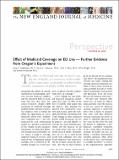Effect of Medicaid Coverage on ED Use — Further Evidence from Oregon’s Experiment
Author(s)
Allen, Heidi L.; Wright, Bill J.; Baicker, Katherine; Taubman, Sarah L.; Finkelstein, Amy
Downloadnejmp1609533.pdf (330.2Kb)
PUBLISHER_POLICY
Publisher Policy
Article is made available in accordance with the publisher's policy and may be subject to US copyright law. Please refer to the publisher's site for terms of use.
Terms of use
Metadata
Show full item recordAbstract
The effect of Medicaid coverage on health and the use of health care services is of first-order policy importance, particularly as policymakers consider expansions of public health insurance. Estimating the effects of expanding Medicaid is challenging, however, because Medicaid enrollees and the uninsured differ in many ways that may also affect outcomes of interest. Oregon’s 2008 expansion of Medicaid through random-lottery selection of potential enrollees from a waiting list offers the opportunity to assess Medicaid’s effects with a randomized evaluation that is not contaminated by such confounding factors. In a previous examination of the Oregon Health Insurance Experiment, we found that Medicaid coverage increased health care use across a range of settings, improved financial security, and reduced rates of depression among enrollees, but it produced no detectable changes in several measures of physical health, employment rates, or earnings.
Date issued
2016-10Department
Massachusetts Institute of Technology. Department of EconomicsJournal
New England Journal of Medicine
Publisher
New England Journal of Medicine (NEJM/MMS)
Citation
Finkelstein, Amy N., Sarah L. Taubman, Heidi L. Allen, Bill J. Wright, and Katherine Baicker. “Effect of Medicaid Coverage on ED Use — Further Evidence from Oregon’s Experiment.” New England Journal of Medicine 375, no. 16 (October 20, 2016): 1505–1507. © 2016 Massachusetts Medical Society
Version: Final published version
ISSN
0028-4793
1533-4406